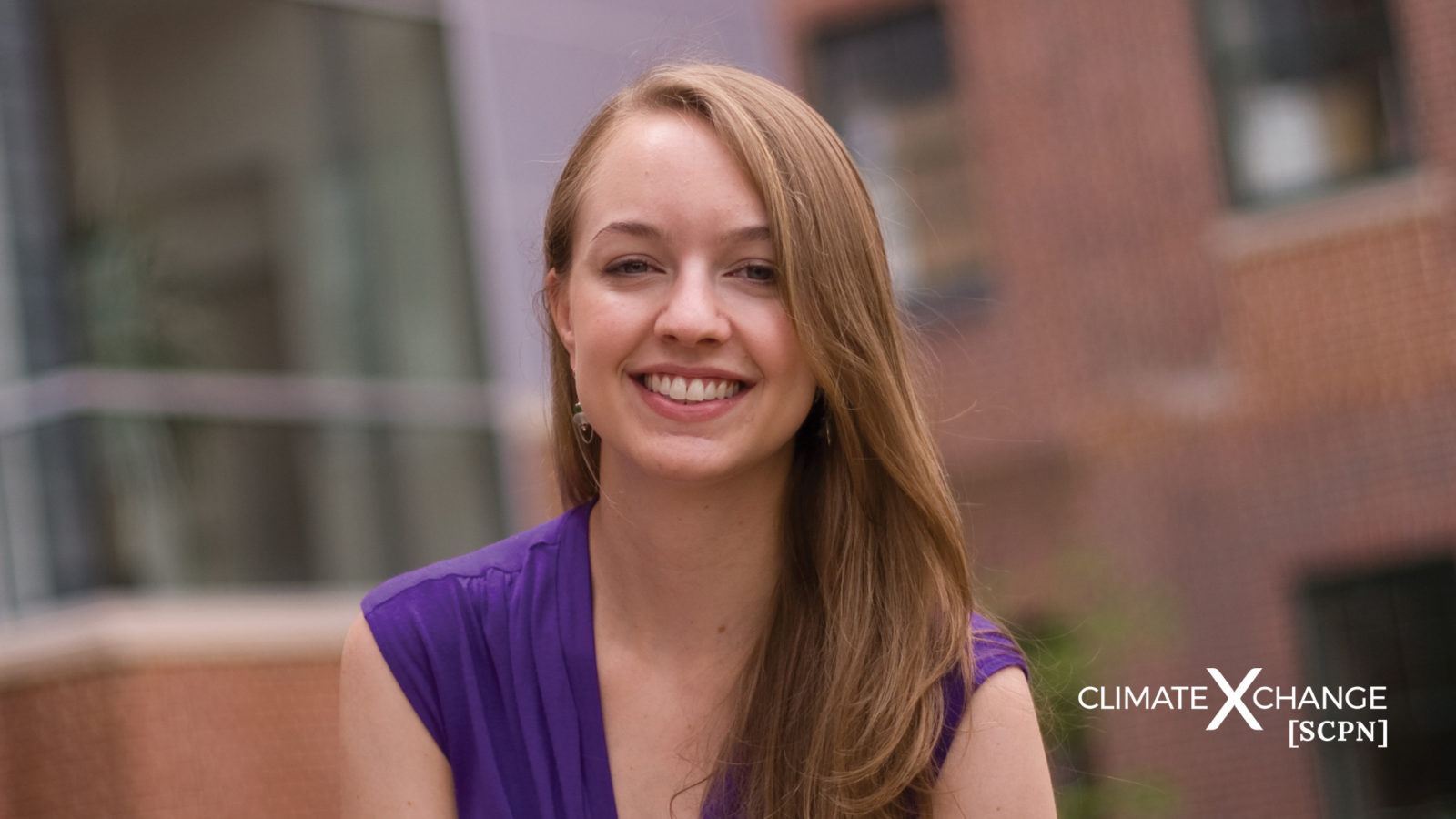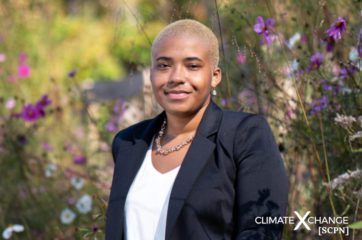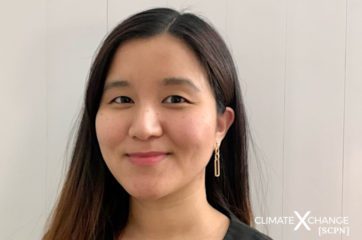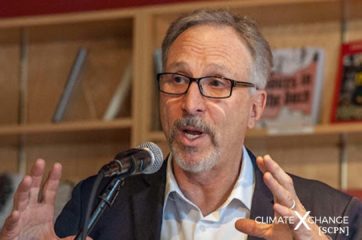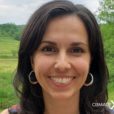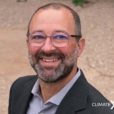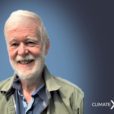All across the country, members of our State Climate Policy Network (SCPN) are fighting to make an impact on climate change in their communities. We have individuals in our Network from all 50 states, each experiencing climate change differently in their local areas and finding unique solutions to build resiliency efforts.
Elizabeth Rhoades, Ph.D., is the Director of the Climate Change and Sustainability Program in the Los Angeles County Department of Public Health. She works across sectors to provide subject matter expertise on the health impacts of climate change, promote policies that reduce greenhouse gas emissions, provide guidance on climate preparedness to local government and community partners, and build workforce capacity to address climate change. Elizabeth received her doctorate in public health from the Johns Hopkins Bloomberg School of Public Health.
Ava Gallo
Thank you so much for joining me today for this conversation. I’m really excited to hear more about your work. Can you start by giving an overview on your background?
Elizabeth Rhoades
Sure! I started out with an undergraduate degree in the field of ecology. I really enjoyed that, but I began to realize at the end of my studies that I was really interested in health and how the environment affects our health. I wanted to approach health from a broad perspective of implementing policies that improve the health of many people at once, rather than from an individual medical perspective. Both are super critical, but I wanted to approach it from the side of crafting policies and programs that promote health for large populations.
After I graduated, I worked for a short time at the LA County Department of Public Health with the Policies for Livable, Active Communities and Environments (PLACE) program, a new program at the time. They do great work on how to support communities with the conditions individuals need to be healthy. At that point, I completely knew that public health was for me. I loved every aspect of the field, even the parts that I don’t directly work on. Our mission in all things we do is to try and enable people to live longer and healthier lives.
Then I went on to do a PhD in public health at Johns Hopkins School of Public Health. At the time I was developing my dissertation, the Copenhagen Climate Conference was happening, and I had a moment when I realized how I could combine these two elements of my interests: the planet and public health.
Then I had the real privilege of doing my dissertation with the Hopi Tribe in Arizona. I grew up in Arizona, and I think part of addressing climate change is realizing the incredibly disproportionate burden that it places on some populations. I worked with the tribe on qualitative research looking at how the drought was affecting their cultural practices and health. I learned so much from that project about approaching research from an ethical perspective. I worked with the tribe’s Cultural Preservation Office to develop a study that was deemed valuable by them for their community. Being able to bring the project back to them with the results was a really formative experience. I’m still in touch with the people I worked with there, and have since gone back and visited them a few times.
As I was graduating, I got this job at the LA County Department of Public Health.
Ava Gallo
Great! I love hearing how people tell their story in their own words. Thank you.
You’ve been at the LA County Department of Public Health for a few years now as the Program Director of the Climate Change and Sustainability Program. How has your role shifted over time and how have you seen climate policy change in the county in the few years that you have been there?
Elizabeth Rhoades
It seems strange that it has been six years! When I started I was the only person at the department solely dedicated to working on climate change, although we had a head start from some great colleagues of mine who had already jump-started the work before I started.
Over six years, we’ve been able to build it into a program, the Climate Change and Sustainability Program. I now have three team members who work with me, which is really fantastic.
I think the biggest change I’ve seen is people finally starting to view climate change as the public health crisis that it is. At the beginning of my work here, the public discourse was still framing climate change as a primarily environmental issue. Over time there has been a lot more recognition of the health impacts of climate change.
That is really important, because for so long when people thought about climate change they thought about polars bears and melting ice caps. I do think knowing about those problems makes people sad, but it’s not immediate to them and their lives. Whereas health is personal, universal, and part of every person’s daily concerns. Transitioning the conversation towards health has been very important, and I’ve been very heartened to see the conversation shifting towards that messaging. Research shows that talking about climate change in the context of health is the most effective way to build support for climate policies.
Ava Gallo
It seems to me such a logical connection to make, but I do think that it is just starting to permeate the messaging on climate action, particularly in the United States. To have you leading this climate work in a public health department is pretty unique. Can you talk about what advantages you see to mobilizing local health departments in the fight against climate change?
Elizabeth Rhoades
The capacity right now for local health departments varies and is pretty limited, which is why a lot of these departments don’t have a dedicated person working on climate change, although a few other local health departments in California do like San Francisco.
It’s really important for local health departments to be resourced in a way that makes it more possible for them to be involved in climate work. They are on the frontlines of protecting the community. One of the many things that is becoming evident from the COVID-19 pandemic is the importance of funding public health. A robust, well-funded public health infrastructure is here to protect you from pandemics, wildfires, heat waves, vector-borne illness, air quality issues, and a lot more.
Local health departments are on the ground every day talking with people, providing services, and fostering the conditions that people need to live healthy lives. We have a long history of community engagement that can be leveraged in climate action.
We also have information about how people are being impacted by climate change, specifically locally. I think that is what people respond best to in terms of information. People respond best to information about how issues are going to affect them personally, which is completely natural and understandable. Instead of talking about national or international problems, local health departments can talk about how people are being impacted in their own communities.
Ava Gallo
Yes, which is what drives a person to action on an issue!
I imagine that your life and work has been taken over by the pandemic. Can you talk more about how COVID-19 has shifted the way that you do your work at the Department of Public Health?
Elizabeth Rhoades
I think like a lot of staff at local health departments across the country, this is a public health crisis of a magnitude that none of us have lived through before. I’ve been redirected almost 100% to working on COVID-19 since late March. But this is temporary, and we still try to keep as much climate work going as possible. I’m proud of what we were able to still accomplish this year in terms of climate work despite the severe emergency.
I think that COVID-19 has brought into light what we all already knew about health disparities. There are deep inequities in our country that contribute to communities experiencing increased impacts from both COVID-19 and climate change. When some people become exposed to COVID-19 they are able to take sick leave or quarantine if they need to, but many people are not able to. Some people are able to telework, but many people are not.
Both COVID-19 and climate change are universal challenges in the sense that no one in the world can completely escape their impacts, and yet the idea that we are all in this together obscures huge disparities in the impacts. Both of these issues impact communities of color and low-income communities disproportionately due to factors such as different workplaces, living conditions, access to care, systemic racism, and all of these disparities that already existed.
I also hope that COVID-19 will be a wake-up call that helps decrease complacency about climate change that is still prevalent in some segments of the population. There is still a lot of denial about climate change, because people just don’t want to believe that things can be as bad as science predicts. People feel invulnerable to those impacts. Maybe COVID-19 has started to puncture that feeling of invulnerability. We are not insulated from global emergencies. The reality that we took for granted in the past can change.
Ava Gallo
I think that we see this undeniable connection between COVID-19, climate change, and racial and economic justice in a way that is so clear. This idea of a green recovery is starting to permeate the conversation with a focus on communities of color and low-income communities.
In our conversation, you’ve talked a lot about the health disparities you see in your work in Los Angeles, the most diverse county in the United States. How do you implement climate change and public health policy that is equitable and justice-oriented?
Elizabeth Rhoades
I think the biggest thing is to recognize that not all people are impacted equally by climate change and not all people are contributing equally to the problem. When we ask people to reduce their emissions, we shouldn’t be targeting that messaging to communities of color and low-income communities that are already highly-burdened and contributing less to climate pollution than more affluent communities. Similarly, when we are thinking about where to provide resources and investments, we need to focus on communities where people are highly impacted and do not have the resources to adapt due to historical injustices and center these communities in decision-making about adaptation.
One of the things that is underway in LA County that I’m particularly excited about is the implementation of OurCounty Sustainability Plan, which was adopted in August 2019. The first big step is to conduct a climate vulnerability assessment that includes both infrastructure vulnerability, but also social vulnerability, which includes health impacts. That is underway right now, and I am serving on the Technical Advisory Committee, along with people from other government agencies, academic institutions, nonprofits, and community-based organizations.
The process includes a lot of stakeholder engagement with cities, communities, and groups who’ve been historically excluded from providing government input. It will incorporate quantitative data with products like a mapping tool and qualitative data about people’s experiences and concerns. Conducting an assessment like this is one of the most critical ways for any jurisdiction to gain an understanding of where its community is most at risk, what are the factors that are contributing to those risks, what are the needs and the resources to help communities adapt and thrive. I am hoping that this will be a really good step forward in terms of implementing policies that address climate change and promote equity.
Ava Gallo
So often the results of these inquiries are these massive reports that aren’t helpful to people on the ground. These shorter outputs are so much more beneficial to the people who participated in the research.
Elizabeth Rhoades
Oftentimes the products are not very interactive either, and we are aiming to make the interface interactive so community members can get out of it what they need. Transitioning to having information online that is interactive and accessible is really important.
Ava Gallo
Exactly! I definitely agree.
What do you see as the biggest obstacles you face to passing the climate and public health policies that you would like to see right now is Los Angeles County?
Elizabeth Rhoades
I really think that we are privileged in so many ways. In Los Angeles, there is a lot of focus on climate issues. But still, funding remains one of the biggest issues, particularly from a public health perspective. There is extremely limited funding for health departments to work on climate change. I’m sorry that is not a very exciting answer for you.
Ava Gallo
It’s a real answer, and something that should be called attention to. Local health departments on the ground that work most intimately with their communities need to be more appropriately funded rather than larger agencies that are less in tune with what a person’s day to day problems are.
Just to wrap up a bit, I always try to end on a more positive note. What keeps you inspired to keep fighting climate change year after year? Being in the climate space can get discouraging, so what keeps you motivated in the face of that?
Elizabeth Rhoades
I was talking with my manager the other day about COVID-19 and how grueling it is to work on this issue, but I remind myself that this is what we all get into public health for. The mission of public health is to protect people’s health and save lives. This is the big crisis that we have all trained for. That is why we are in this field.
I also feel that way about climate change. I truly believe that climate change is the greatest challenge of this century, maybe the greatest challenge that we will ever face. It makes me very angry that people who have contributed the least to climate change are suffering its worst impacts. I think that this is on our watch. To me, this is the biggest and most important thing there is to address.
Also, I think all the people who I work with inspire me. In both the public health world and the climate change and sustainability world, the people are doing the work because they really believe in the mission. It’s a privilege to work with a group of people who are trying so hard to make the world a better place.
Ava Gallo
I definitely can relate. Being a part of the State Climate Policy Network and hearing from people across the country on our monthly calls is really inspiring.
Thank you so much for your time. It’s been wonderful to hear more about your career. I think the work you are doing is really amazing. Thank you!
Elizabeth Rhoades
Thank you for selecting me for this. It’s been lovely talking to you. I appreciate the great questions and the conversation!

